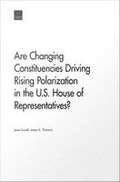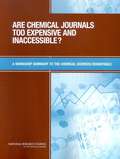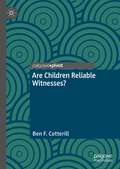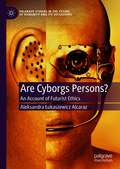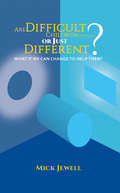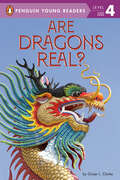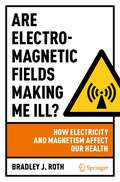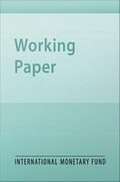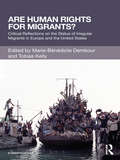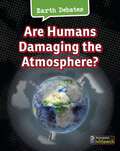- Table View
- List View
Are Capital Controls Effective in the 21st Century? The Recent Experience of Colombia
by Benedict Clements Herman KamilA report from the International Monetary Fund.
Are Changing Constituencies Driving Rising Polarization in the U.S. House of Representatives?
by Jesse Sussell James A. ThomsonThis report addresses two questions: first, whether the spatial distribution of the American electorate has become more geographically clustered over the last 40 years with respect to party voting and socioeconomic attributes; and second, whether this clustering process has contributed to rising polarization in the U.S. House of Representatives. We find support for both hypotheses and estimate that long-term geographical clustering of voters is responsible for roughly 30 percent of the increase in polarization in the House between the 93rd and 112th Congresses. An important ancillary finding is that the within-district percentage of adults who are married dwarfs other socioeconomic variables — including those measuring race, education, income, and urbanicity — as a predictor of local partisanship, as measured by both the party affiliation of the House representative and the presidential vote share.
Are Chemical Journals Too Expensive And Inaccessible?: A Workshop Summary To The Chemical Sciences Roundtable
by National Research Council of the National AcademiesOn October 25-26, 2005, the Chemical Sciences Roundtable held a workshop to explore issues involving those who use and contribute to chemical literature, as well as those who publish and disseminate chemical journals. As a follow-up to the workshop, a summary was written to capture the presentations and discussions that occurred during the workshop. As a forum to discuss chemistry journals within the larger context of scientific, technical and medical journal publishing, the workshop covered whether chemists and chemical engineers have unique journal needs and, if so, whether these needs are being met in the current journal publishing environment. Workshop participants also tackled how open access publishing might be applied to the chemical literature, such as to provide authors more freedom to distribute their articles after publication and allowing free access to chemical literature archives.
Are Children Reliable Witnesses?
by Ben F. Cotterill"If a child falls victim to a crime, or becomes witness to it, they may well be questioned by the police. Perhaps even tasked with selecting a suspect from a line-up. But how reliable can a child be under such strenuous circumstances?In this book, Dr. Ben Cotterill explores practices and influences that can increase or decrease the accuracy of children’s testimonies. Memory mechanisms and general developmental factors behind the capability of child witnesses are outlined, demonstrating their ability to describe or identify. Factors that affect jurors' perception of said children are also looked into in detail.There have been many instances in which poor interviewing practices with children led to false imprisonments. Said occurrences demonstrate how both situational factors and individual differences can potentially compromise children’s eyewitness performance. Based upon what we now understand, can recommendations be made, so that, in a court of law, innocence is the key to achieving justice?
Are Christians Mormon?: Joseph Smith And Converging Christian Theologies
by David L. Paulsen Hal R. BoydIn the past, scholars and others have asked whether Mormons are Christian. This work reverses the question by asking, "are Christians Mormon?" By identifying Mormon doctrines formerly considered heretical and documenting how these doctrines have gained increasing acceptance within mainstream Christian theologies, the work presents some surprising insights. In chapters focusing on subjects such as deification, the divine feminine, and the reopening of the scriptural canon, among others, the book sets out Joseph Smith's teachings on these ideas, summarizes the criticisms of those positions, and examines trends in contemporary Christian theology that significantly converge in Joseph's direction. Exploring the convergence of contemporary Christian theology with Mormon doctrines, this book will appeal to a broad range of students and readers exploring Christian theology and the Latter-day Saint tradition.
Are Credit Default Swap Spreads High in Emerging Markets? An Alternative Methodology for Proxying Recovery Value
by Manmohan SinghA report from the International Monetary Fund.
Are Currency Crises Predictable?1
by Ilan Goldfajn Rodrigo O. ValdésA report from the International Monetary Fund.
Are Currency Crises Predictable? A Test
by Andrew Berg Catherine PattilloA report from the International Monetary Fund.
Are Cyborgs Persons?: An Account of Futurist Ethics (Palgrave Studies in the Future of Humanity and its Successors)
by Aleksandra Łukaszewicz AlcarazThis book presents argumentation for an evolutionary continuity between human persons and cyborg persons, based on the thought of Joseph Margolis. Relying on concepts of cultural realism and post-Darwinism, Aleksandra Łukaszewicz Alcaraz redefines the notion of the person, rather than a human, and discusses the various issues of human body enhancement and online implants transforming modes of perception, cognition, and communication. She argues that new kinds of embodiment should not make acquiring the status of the person impossible, and different kinds of embodiments may be accepted socially and culturally. She proposes we consider ethical problems of agency and responsibility, critically approaching vitalist posthuman ethics, and rethinking the metaphysical standing of normativity, to create space for possible cyborgean ethics that may be executed in an Extended Republic of Humanity.
Are Developing Countries Better Off Spending Their Oil Wealth Upfront?
by Hajime Takizawa Edward H. Gardner Kenichi UedaA report from the International Monetary Fund.
Are Diamonds Forever? Using the Permanent Income Hypothesis to Analyze Botswana's Reliance on Diamond Revenue
by Olivier BasdevantA report from the International Monetary Fund.
Are Difficult Children Difficult, or Just Different? What if We Can Change to Help Them?
by Mick JewellAs an adult working with, or caring for, 'difficult' children, how can you change your approach to suit the differing learning and progression needs necessary to advance the children? Are Difficult Children Difficult, or Just Different? What if We Can Change to Help Them? is aimed at teachers, social workers, foster carers, adoptive parents, birth parents, medical professionals and any adult involved with young people who do not present in line with the majority of expected behaviours and traits regularly seen in children aged between 5 and 16 years old. This problem is growing and we need to adapt. Tried and tested strategies and real-life examples are described in detail to help you alter your approach, in lieu of attempting to change the brain pattern of the 'difficult child'. Bringing them in line with more traditional methods that quite simply do not, will not and cannot work in the long term is not an option. It is a refreshing and positive approach that you will enjoy whilst you build and share improved strategies for dealing with and helping young people 'outside the norm' of traditional teaching and parenting styles.
Are Donor Countries Giving More or Less Aid?
by Sanjeev Gupta Catherine Pattillo Smita WaghA report from the International Monetary Fund.
Are Dragons Real? (Penguin Young Readers, Level 4)
by Ginjer L. ClarkeLearn about the history of dragons in this photographic nonfiction leveled reader perfect for kids interested in the natural - and unnatural - world!Did you know that Marco Polo, Alexander the Great, and other explorers all described seeing dragons in their ancient travels? Or that the Komodo dragon may not breathe fire, but it has a venomous bite to help catch its prey? Even today there are still some types of dragons roaming the earth!Embracing children's delight in the mythical creatures while also imparting fascinating facts about the real ones, discover the history of these special animals and decide for yourself if you believe in dragons!With simple language and vivid photographs, Are Dragons Real? is perfect for emerging readers curious about the natural world and this legendary creature.
Are Electromagnetic Fields Making Me Ill?: How Electricity and Magnetism Affect Our Health
by Bradley J. RothElectricity and Magnetism (E&M) underlies many lifesaving medical devices, such as magnetic resonance imaging scanners, neural stimulators, and heart pacemakers. But E&M also attracts its share of bogus health claims, such as biomagnetic therapy. How do you separate the good from the bad? Sometimes it’s not easy: experiments are prone to artifacts, theories are limited by assumptions, and clinical trials can result in ambiguities. In this book, the author separates the wheat from the chaff, showing which applications of E&M are bogus and which are not. This book takes the reader on a tour through a range of fascinating phenomena, from effects that are constant in time at one extreme, such as transcranial direct current stimulation of the brain, to the millimeter-wave whole-body scanners which are familiar to frequent flyers at the other. Along the way, the author looks in depth at the dispute about power line magnetic fields and leukemia, a case study in what can go wrong when dubious claims inflame unjustified fears. The debate about cell phones and brain cancer still rages today, particularly for the microwave frequencies encountered with new 5G technology. Recently, the so-called Havana Syndrome has been attributed to microwave weapons, but the underlying biophysics of such weapons is unclear. For all these encounters with electricity and magnetism, the author, an eminent biophysicist, uses science and evidence to sort out fact from fantasy. This book is aimed at general readers who want to make sense of the mysterious and often controversial ways in which E&M interacts with the human body. It is also ideal for students and professionals in bioscience and health-related fields who want to learn more without getting overwhelmed by theory.
Are Emerging Asia's Reserves Really Too High?
by Marta Ruiz-Arranz Milan ZavadjilA report from the International Monetary Fund.
Are Emerging Market Countries Learning to Float?
by Dalia S. HakuraA report from the International Monetary Fund.
Are Financial Crises Alike?
by Mardi Dungey Renee Fry Brenda González-Hermosillo Vance L. Martin Chrismin TangA report from the International Monetary Fund.
Are Generational Categories Meaningful Distinctions for Workforce Management?
by National Academies of Sciences, Engineering, and Medicine Division of Behavioral and Social Sciences and Education Board on Behavioral, Cognitive, and Sensory Sciences Committee on the Consideration of Generational Issues in Workforce Management and Employment PracticesHeadlines frequently appear that purport to highlight the differences among workers of different generations and explain how employers can manage the wants and needs of each generation. But is each new generation really that different from previous ones? Are there fundamental differences among generations that impact how they act and interact in the workplace? Or are the perceived differences among generations simply an indicator of age-related differences between older and younger workers or a reflection of all people adapting to a changing workplace? Are Generational Categories Meaningful Distinctions for Workforce Management? reviews the state and rigor of the empirical work related to generations and assesses whether generational categories are meaningful in tackling workforce management problems. This report makes recommendations for directions for future research and improvements to employment practices.
Are Great Leaders in Control of Their Companies?: An Evidence-Based Approach to Leadership
by Robert I. Sutton Jeffrey PfefferThis chapter explores the half-truth that leaders are in control and that they ought to be, provides a more nuanced view of leadership, and offers some useful guidelines for those who occupy leadership roles in organizations.
Are House Prices Rising Too Fast in China?
by Ashvin Ahuja Lillian Cheung Gaofeng Han Nathan Porter Wenlang ZhangA report from the International Monetary Fund.
Are House Prices Rising Too Fast in Hong Kong SAR?
by Ashvin Ahuja Nathan PorterA report from the International Monetary Fund.
Are Human Rights for Migrants?: Critical Reflections on the Status of Irregular Migrants in Europe and the United States
by Marie-Bénédicte Dembour Tobias KellyHuman rights seemingly offer universal protection. However, irregular migrants have, at best, only problematic access to human rights. Whether understood as an ethical injunction or legally codified norm, the promised protection of human rights seems to break down when it comes to the lived experience of irregular migrants. This book therefore asks three key questions of great practical and theoretical importance. First, what do we mean when we speak of human rights? Second, is the problematic access of irregular migrants to human rights protection an issue of implementation, or is it due to the inherent characteristics of the concept of human rights? Third, should we look beyond human rights for an effective source of protection? Written is an accessible style, with a range of socio-legal and doctrinal approaches, the chapters focus on the situation of the irregular migrant in Europe and the United States. Throughout the book, nuanced theoretical debates are put in the context of concrete case studies. The critical reflections it offers on the limitations and possibilities of human rights protections for irregular migrants will be invaluable for students, scholars and practitioners.
Are Humans Damaging the Atmosphere? (Earth Debates Ser.)
by Catherine ChambersCar, train, ship or aeroplane – which form of transport is most harmful to the atmosphere? What do farming techniques such as agrochemicals do? What is ‘acid rain’ and what are effects of it? This book takes a look at the impact that our modern world is having on our surrounding environment, from our use of fossil fuels and our increase in global food production and building work, to the rise in our transport production. Discover what steps scientists and engineers, and even ordinary people, are taking to develop sustainable solutions to these problems, from replastering festivals to buildings bound together using horse hair!

